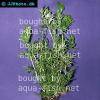Ceratopteris cornuta
Scientific name: Ceratopteris cornuta
Family: Parkeriaceae
Maximum size reached under cultivation: 20 - 50 cm (7.87 - 19.69 inch)
014
Recommended pH range: 5.4 - 8
Recommended water hardness: 4 - 18°dGH (71.43 - 321.43ppm)
0°C 32°F30°C 86°F
Recommended temperature range: 17 - 28 °C (62.6 - 82.4°F)
Preferred propagation method: Lateral shoots
Native to: Southeast Asia
Growth rate: Fast
Recommended substrate: Fine gravel
Lighting requirements: Bright
Ideal placement in tank: Background
🌱 Common Names
Water Sprite (most common), Indian Fern, Water Fern
🌍 Origin
Ceratopteris cornuta is native to Southeast Asia, especially India and regions of Southeast Asia. It thrives in tropical and subtropical wetlands such as marshes, rice paddies, and slow-moving streams.
🌱 Propagation
Ceratopteris cornuta reproduces both sexually via spores and vegetatively by producing adventitious plantlets on its older leaves. In aquariums, propagation is easy: once the small daughter plants develop roots, they can be gently separated and replanted elsewhere. This species is highly prolific under optimal conditions.
💧 Water Parameters
- pH range: 5.4 - 8.0
- Water hardness: 4 - 18°dGH (71.43 - 321.43 ppm)
- Temperature: 22 - 30°C (71.6 - 86°F)
⚙️ Difficulty
Medium
📈 Growth Rate
Fast under bright lighting and adequate nutrient conditions. Slower and leggier in low-light setups.
💡 Lighting Requirements
Bright lighting is preferred for compact, healthy growth. In low-light aquariums, leaves tend to elongate and become sparse.
🏞️ Planting Area
Midground to background. Water Sprite can be planted in the substrate or left floating. Floating encourages faster growth, abundant plantlet production, and provides excellent shade and shelter for fish and shrimp.
📝 Short Description
Ceratopteris cornuta is a versatile, fast-growing aquatic fern capable of thriving both submerged and floating. Naturally found in shallow tropical wetlands, it easily adapts to full submersion in aquariums. Its finely divided, soft leaves offer ideal cover for fry and shrimp. Due to its rapid growth, regular pruning is recommended to prevent overcrowding and to maintain healthy circulation within the tank. In some regions, Water Sprite is even consumed as a vegetable, either raw or cooked.
❓ FAQs
-
Can Ceratopteris cornuta be used as a floating plant?
Yes. Floating Water Sprite grows rapidly, creates natural shade, and provides excellent cover for fry and shrimp. Floating plants also tend to produce more daughter plants compared to rooted ones.
-
How can I propagate Water Sprite in my aquarium?
Simply wait for small plantlets to form on older leaves. Once they develop roots, gently detach and replant them elsewhere in the aquarium without harming the parent plant.
-
Why are the leaves of my Water Sprite turning yellow?
Yellowing may indicate nutrient deficiencies, particularly a lack of nitrogen or iron. Regular liquid fertilization and substrate supplements can help maintain vibrant growth.
-
Can Water Sprite be grown in low-tech tanks?
Yes, although growth will be slower and the plant will appear leggier. For denser and healthier foliage, provide bright lighting and regular fertilization. CO2 supplementation is optional but beneficial.
-
Is Ceratopteris cornuta safe for fry and shrimp?
Absolutely. Its delicate, feathery leaves offer perfect shelter and hiding places for fry and small invertebrates.

 Ceratopteris thalictroides
Ceratopteris thalictroides